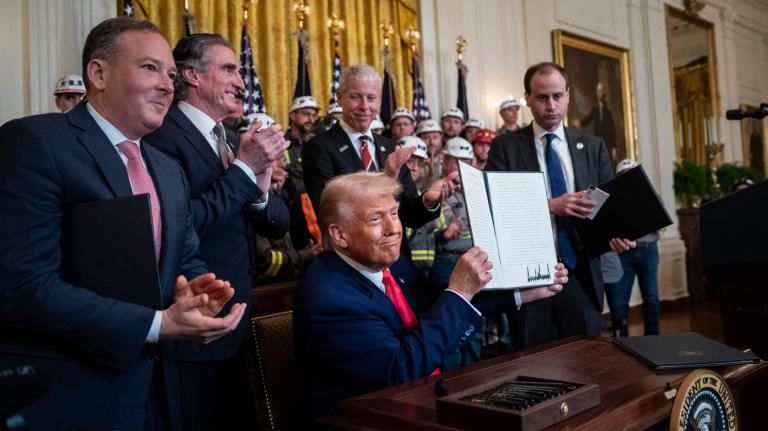Michelle Obama went before the Grocery Manufacturers Association today seeking its support for her “Let’s Move” anti-obesity initiative. The GMA, which counts food companies like Kraft, General Mills, and Coca-Cola among its membership, isn’t necessarily friendly territory for Michelle Obama. But if the standing ovation she received is any indication, Big Food is trying hard to show it’s on the right side of the obesity issue.
Still, according to the AP, the First Lady made sure to keep things civil.
Obama said she would like to see less confusing food labels and portion sizes and increased marketing for healthy foods. She urged companies not just to find creative ways to market products as healthy but actually increase nutrients and reduce bad ingredients.
“While decreasing fat is good, don’t replace it with sugar,” she urged. “This needs to be a serious industry wide commitment to provide healthier foods.”
Obama’s campaign is largely focused on school lunches and vending machines, along with making healthy food more available and encouraging children to exercise more.
Absent from her speech was any mention of that thing government does. You know, where they add a charge on top of the retail price of a product. To raise money. Whatchmacallit. Oh, yeah. Taxes! Whew. That was hard to say.
Now, I’m not suggesting the First Lady shouldn’t broach the topic of obesity via the low-hanging fruit of corporate partnerships, education and exercise. Indeed, there’s no question that including the biggest food companies — the ones that former FDA chief David Kessler will tell you are largely responsible for the huge increase in our caloric intake over the last 30 years — is a necessary pre-condition to addressing obesity. But that doesn’t mean it’s sufficient.
At some point, the First Lady, or the president, or someone in government is going to have to bring the hammer down and announce that reducing access to and increasing the cost of unhealthy food is going to be a major part of addressing obesity.
A slew of recent studies have come out recently suggesting just that. Dr. Barry Popkin at UNC looked at historical food consumption data among young adults and found that increased junk food prices did result in lower caloric intake and less weight gain. I wrote previously about another “lab experiment” that demonstrated similar results.
Meanwhile, a study out of Kansas that hasn’t gotten nearly enough attention indicates there are risks associated with leaving taxes out of the equation. In this work, a group of researchers at Kansas State examined the relationship between obesity and food access for low-income women (as represented by recipients of government-funded WIC food benefits). Here’s what they found:
[T]he availability and density of food stores was not associated with obesity in metropolitan and rural areas. However, contrary to previous studies, the findings showed that the presence of a supermarket is not protective against obesity for women in these areas. Women who resided in micropolitan areas in Kansas had an 18 percent increase in obesity risk when living within a 1-mile radius of a supermarket. The presence of small grocery and convenience stores also was associated with an increased risk of obesity. [emphasis added]
The point here isn’t that food deserts, reduction of which is a central part of the “Let’s Move” campaign, aren’t real or that they don’t matter at all — though it’s striking that in small Kansas cities, access to supermarkets was actually associated with an increased risk of obesity. It’s that the overall food environment plays a much more important role. Another way to put it is that it’s not so much the stores as what’s in them and what’s near them that is the problem.
Futzing with industrial food recipes won’t make much difference as long as we are surrounded by opportunities to consume empty calories. Complicating matters is the fact that, without taxes or subsidies, healthy food will always be more expensive than unhealthy food. And not just because of our skewed farm subsidy system — but because inferior products are always cheaper.
As a political scientist of my acquaintance observed to me, Americans are by and large motivated by the idea of “negative liberty.” We want freedom from interference by government in our daily lives more than we want anything else. Typically, that’s captured in the phrase, “This is America. I should be able to [fill in the blank] any time I want.” As a result, attempting to restrict consumption of harmful goods (like tobacco, alcohol, SUVs or — yes — sugary drinks) becomes almost impossible since denial of that good to “deserving” Americans will invariably take place.
Unfortunately, restricting access to unhealthy food, however we manage it, is an unavoidable necessity for any serious attempt to reduce obesity. The only question is whether we’ll ever find the courage to admit it.




